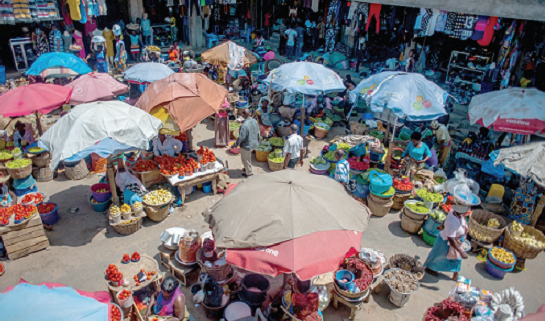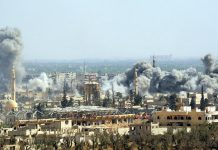OCTOBER 06, 2015: FINANCIAL EXPRESS
The informal sector or informal economy is a phenomenon which is an integral part of the economy as a whole. This sector is neither taxed, nor monitored by any government agency. Various activities that are engaged in the informal economy are not reflected in the accounting of Gross Domestic Product (GDP) of a country. This sector is also termed as the shadow economy.
Informal sector contributes more than 40 per cent to the total economy in developing countries like Bangladesh. This sector is pretty much troublesome and unmanageable by the regulatory bodies. However, the informal sector provides the poor with attractive economic opportunities, instant financial benefits and has been expanding rapidly since the 1960s. Therefore, merging the informal sector with the formal economy is an important policy challenge.
According to the Swedish International Development Cooperation Agency (SIDA), the key drivers for the growth of informal economy in the twenty-first century include:
– limited absorption of labour, particularly in countries with high rates of population or urbanisation;
– excessive cost and regulatory barriers for entry into formal economy, often plagued by corruption;
– weak institutions and training opportunities as well as infrastructural inadequacies;
– increasing demand for low-cost goods and services;
– migration prompted by economic hardship and poverty; and
– difficulties faced by women in gaining formal employment.
It is a historical fact that as the economy of a country matures, economic activities gradually shift from the informal to the formal sphere. As a matter of fact, development of a country is reflected in the pace of integration of the informal sector into the formal one.
Informal Sector Survey (ISS) conducted by the Bangladesh Bureau of Statistics (BBS) shows that the informal sector serves as an important source of employment primarily contributing to high labour intensive production. Out of 54 million jobs in the country’s labour market in 2010, about 42 million were held in informal enterprises. This data show how important the informal sector is in Bangladesh though this country is shifting from agro-based economy to industrialisation during the last two decades. The survey also indicates that the informal sector provide about 89 per cent of the total number of jobs, with female reporting a higher incidence at 93 per cent compared to the males at 87 per cent. 49 per cent of the jobs are mainly undertaken in the agricultural sector, 34 per cent in the service sector, and 17 per cent in the industrial sector. This has been augmented largely by market economy and liberalisation of trade regime.

If we look into the global scenario, we will find that informal employment makes up 48 per cent of non-agricultural employment in North Africa, 51 per cent in Latin America, 65 per cent in Asia, and 72 per cent in sub-Saharan Africa. If agricultural employment is included, the percentage in some countries like India and many sub-Saharan African countries would be beyond 90 per cent. Estimates for developed countries are around 15 per cent. In developing countries like Bangladesh, the largest part of informal work, around 70 per cent, is self-employed that ranges from self-employment or unpaid family labour to street vendors, shoe shiners, and junk collectors.
Some informal activities, such as small-scale service or manufacturing businesses, have more limited entry into the formal economy and require higher set-up costs. It might include complicated licensing regulations, and irregular hours of operation. However, most workers in the informal sector, even those are self-employed or wage workers, do not have access to secure works, benefits, welfare protection or representation.
In Bangladesh, people of limited income can get almost all of their consumer products from the footpath vendors or informal market places. During the religious festivals, especially Eid, numerous products are sold worth hundreds of millions of taka in the informal business sector.
People, suffering from extreme poverty and losing their land and home due to river erosion have no other way but to take shelter in the slums of major cities in the country. As the informal business is small in size and transient in nature, almost all of those people try their best to engage themselves in various small informal businesses, such as pulling rickshaw, selling chocolates, cigarette, beetle leaf, bottled water, beverage, bakery products, traditional cakes, garments, fruits and vegetables, even mobile phones, electronic accessories.
These people remain untaxed and are far from being under any regulatory formal network. Though they are not under taxation, they are to pay money to the corrupted police, terrorists, local political leaders or organised extortionists. This is really a big challenge for the policy makers to regulate the informal sector as well as to integrate it into the formal economy.
Some policy makers view the informal sector as disruptive to the national economy and a hindrance to development. They consider the informal economy as a fraudulent activity that results in the loss of revenue from taxes and creates unfair competition with many accompanying vices. These characteristics have led many countries to pursue a policy of deterrence with strict regulation and punitive actions. We have witnessed stray moves in this country also but these did not yield any positive results mainly due to the lack of a medium-to- long term planning.
Special rehabilitation packages, incentives and soft credit facilities should be implemented for the street vendors and scores of people associated with the informal market places. Setting up permanent places for them could be a starter to facilitate their business operations as well as bring them under the umbrella of taxation. They should be given tax-break facilities and hassle-free procedure for paying taxes.
However, informal sector is the most suitable source of income for people with marginal income as well as for those living below poverty line. This sector helps elevate them from the poverty line, increase their purchasing power and upgrade their standard of living that eventually keep the cycle of economy moving.
© Copyright: Reserved by the writer (Noore Alam Siddiqui)



































